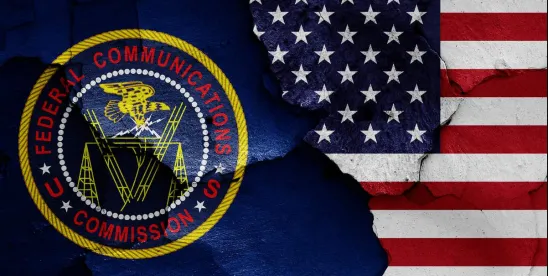On July 25, 2025, the Federal Communications Commission (“FCC”) issued a new pole attachment order that further reformed the Commission’s rules and policies governing communications attachments to utility poles.
The order builds on the FCCs’ December 2023 rule amendments intended to facilitate and expand access to high-speed broadband services, especially in rural and under- or unserved areas of the country. Among other things, the FCC’s latest order:
- Codifies new access timelines for large pole attachments applications;
- Establishes advance notice and meet-and-confer requirements for mid-size and large pole attachment applications;
- Requires utilities to accept bulk applications without arbitrary limitations on size or frequency;
- Improves self-help rights for make-ready cost estimates; and
- Expedites approval of qualified contractors.
The order also contains a further notice of proposed rulemaking (“FNPRM”) soliciting additional stakeholder input to streamline pole permit applications, make-ready and broadband deployment—while also seeking comment on whether light poles should be subject to access mandates of Section 224(f) of the Communications Act. The FCC also addressed petitions for clarification and/or reconsideration regarding the FCC’s December 2023 Wireline Infrastructure Declaratory Ruling.
Key Rule Changes
| Rule/Requirement | What’s New |
|---|---|
| Advance Notice for Mid-Size and Large Pole Orders | 15-day written notice for “Mid-Sized Orders” (between 300 and 3,000 poles or between 0.5% and 5% of a utility’s in-state poles, as part of one project) 60-day written notice for “Large Orders” (between 3,000 and 6,000 poles or between 5% or 10% of utility’s in-state poles, as part of one project) |
| Large Order Timelines | Codified Large Order timelines for application completeness review, one-touch make-ready review, make-ready estimate, survey/review on merits, and make-ready completion |
| Meet-and-Confer Requirement for Very Large Orders | Utilities and attachers must negotiate processing details for pole orders exceeding 6,000 poles (or 10% of a utility’s poles in a state), though the lesser of the first 6,000 poles (or 10% of the utility’s poles in a state) are subject to the Large Order timelines |
| Notification Regarding Survey and Make-Ready Timelines | Utilities and existing attachers must notify new attachers if they know or reasonably know they cannot meet survey or make-ready timelines |
| Self-Help for Estimates | Attachers can now generate their own make-ready estimates if a utility misses its deadline |
| Contractor Approval | Utilities must act on requests to add qualified contractors to approved lists within 30 days (or request deemed granted) |
| Prohibition on Anti-Bulk Limits | Utilities may not impose limits that effectively prevent attachers from filing and processing bulk applications |
Timelines for Large Pole Applications
FCC rules previously required attachers and utilities to negotiate in good faith timelines for applications above 3,000 poles (or 5% of a utility’s poles in a state). Numerous attaching parties submitted comments detailing frustrations associated with protracted negotiations that delayed broadband buildouts. To address these concerns (as well as balance utility concerns regarding better planning and coordination), the FCC adopted a new level of defined timelines for processing Large Orders, a new requirement for written advanced notice for Mid-Sized and Large Orders, as well as a meet-and-confer requirement for Large Orders:
- Advance Notice: Attachers now must provide utilities with 15-day advance written notice for Mid-Sized Orders and 60-day notice for Large Orders. The notice must “set forth detailed information that will allow the utility to properly assess the potential resource needs for the order, including but not limited to: (1) the new attacher’s contact information: (2) a description of the proposed deployment area(s) and anticipated route(s); (3) an anticipated build-out schedule; and (4) for a Large Order a request to meet and confer with the utility within 30 days of the date of the notice.”
- If an attacher does not provide the requisite advance notice, including the required minimum information, then the utility may notify the attacher that it is treating the application as the requisite advance notice; that the application will commence the advance notice period; and, if it is a Large Order, that the attacher must request the meet-and confer required by our rules.
- If the attacher fails to request the meet-and-confer described below, then the advance notice period will not begin to run until such request is made.
- And if a utility fails to give prompt notice that it is treating the attacher’s application as the advance notice, then the application must be processed under the applicable timelines without an advance notice period or meet-and-confer requirement.
- Meet-and-Confer: Utilities and attachers are now required to meet (virtually or in-person) within 30 days of advance notice for Large Orders to (i) jointly plan workflow; (ii) prioritize permit areas: and (iii) identify resource/contractor needs. Note: This obligation is not required for Mid-Sized Orders.
- Standardized Timelines for Large Orders: For Large Orders, utilities now must meet deadlines for each phase of the pole access process (application review, survey, estimate, and make-ready work):
- Application Completeness Review: 10 business days after complete
- One-Touch Make-Ready Review: 10 business days for completeness; 45 days for response on the merits after application is complete
- Survey/Review on the Merits: 90 days after application is complete
- Make-Ready Estimate: 29 days after survey
- Communications Space Make-Ready: 120 days after attacher payment
- Electric Space Make-Ready: 180 days after attacher payment
- Very Large Orders: For applications to over 6,000 poles (or to more than 10% of a utility’s in-state poles), parties must negotiate schedules in good faith.
- However, the lesser of the first 6,000 poles (or 10% of the utility’s poles in the state) of that application are subject to the new make-ready timelines for Large Orders, if the attacher designates in its application that the first 6,000 poles (or 10% of the utility’s poles in the state) to be processed.
Updates to Current Pole Attachment Timelines
The new order also seeks to improve existing pole attachment timelines in 47 C.F.R. § 1.1411 and 1.1412 in several respects:
- Utility and Existing Attacher Notices to Enable Quicker Self-Help: To improve early communication about whether utilities will be able to timely process pole applications within the existing timeframes, the FCC now requires utilities to notify new attachers within 15 days of receipt of a complete application if they know or reasonably should know that they cannot meet the survey timelines.
- Utilities also must notify new attachers as soon as practicable but no later than 15 days after payment of a make-ready estimate if they know or reasonably should know that they cannot meet the make-ready timelines.
- Existing attachers also must notify the utility and the new attacher as soon as practicable but no later than 15 days after receiving the make-ready notice from the utility that the existing attacher knows or reasonably should know that it cannot meet the make-ready deadline.
- If a utility or existing attacher provides this notice, then the new attacher can conduct self-help upon receipt of that notice instead of having to wait until the relevant timeline runs. But if the utility or existing attacher does not give advance notice to the new attacher of its inability to meet the survey or make-ready deadlines, then the new attacher must wait until the end of the relevant timeline to engage in self-help.
- Enhanced Self-Help Rights: If a utility misses its deadline to provide a make-ready estimate (now 14 days for most projects, 29 days for Large Orders), the FCC now permits an attacher to generate its own estimate using a qualified contractor.
- This new self-help remedy is unavailable for pole replacements, and utilities may review and approve the estimates at the attacher’s expense, though such expenses “must be reasonable and based on only the actual costs incurred by the utility in reviewing the estimate.”
- The utility then must make a written decision on the self-help estimate within 14 days of receipt or before it is withdrawn by the attacher, whichever is later.
- If the pole owner accepts the estimate, then the estimate it is subject to the reconciliation process in 47 C.F.R. § 1.1411(d)(3); if not, then the utility must detail in writing the reasons for non-acceptance, and the attacher can submit a revised estimate to the utility without restarting the pole attachment timeline.
- Contractor List Additions: Utilities now have 30 days to respond to attacher requests to add new qualified contractors to approved contactor lists. Unanswered requests will be “deemed approved.” The FCC found that “failing to respond to an attacher’s request to add an additional contractor for months creates such a choke-point and failing to respond at all certainly does.”
- Utilities may still disqualify a contractor that was previously approved or deemed approved based on reasonable safety or reliability concerns related to a contractor’s failure to meet the minimum qualifications described in 47 C.F.R. § 1.1412(c), or to meet the utility’s uniformly applied and reasonable safety or reliability standards.
Utility Restrictions on Order Size and Frequency Curtailed
The FCC order bars utilities from combining limits on pole application size and application frequency that effectively restrict the number of pole permit applications in a given timeframe.
- For example, if an attacher has a 3,500 pole project, the utility cannot impose limits on the size and/or frequency of application(s) that would prevent the attacher from submitting a 3,500 pole order in a 30-day period.
***
The FCC’s new rules will go into effect 30 days after publication in the Federal Register.
Further Notice of Proposed Rulemaking (FNPRM)
The FCC’s seeks additional comment on a host of outstanding issues, including:
- Deployment Compliance: Whether attachers should be required to deploy equipment on poles within 120 days of completed make-ready work.
- Make-Ready Payment Deadline: Whether the FCC should require attachers to make payment on an estimate to a utility within a specific period of time after the attacher’s acceptance of the estimate.
- Make-Ready Cost Ceilings: Whether there should be a “cost ceiling,” with prior approval required, for make-ready costs that exceed the initial utility estimate by a set amount.
- OTMR for Complex Work: Whether OTMR should be available for complex survey and make-ready work.
- On-Boarding Approved Contractors: Recognizing that the process to on-board a newly approved contractor can take months to a years (if not longer), the FCC seeks comment whether the rules should set a deadline for utilities to complete contractor onboarding.
- Light Poles: Whether light poles should be included under the definition of “pole” in Section 224 of the Communications Act.
The FNPRM also generally seeks comment on “any other causes for delay or other issues that commenters believe will help facilitate deployments”; the impact of application fees and related costs on broadband deployment; and what actions, if any, the FCC can take to address “utility-imposed fees or engineering requirements before the make-ready stage that inhibit broadband deployment.”
Initial comments on the FCC’s FNPRM in Wireline Competition Bureau Docket No. 17-84 will be due 30 days after Federal Register publication, and reply comments will be due 60 days after Federal Register publication.
Orders on Reconsideration
Finally, the FCC addressed two petitions for clarification and/or reconsideration of the FCC’s 2023 Wireline Infrastructure Declaratory Ruling regarding pole replacement allocation costs and the provision of cyclical pole inspection reports by utilities that were filed by two groups representing electric utility pole owner interests—the Edison Electric Institute (“EEI”) and the Coalition of Concerned Utilities (“CCU”).
- EEI Petition
- Pole Replacements. The FCC denied EEI’s request to remove or revise the clarification that a pole replacement is not “necessitated solely” by an attachment request if a utility’s change to its internal construction standards causes the replacement.
- The FCC, however, granted EEI’s clarification request finding that, while utilities may refuse an attacher’s request to replace an existing pole due to lack of capacity, a pole replacement is not “necessitated solely” by a new attachment request when it is necessitated (in part) by the utility’s decision to adopt a new construction standard for the pole, even when the pole lacks capacity because of the new standard.
- Utility Easements. The FCC denied reconsideration of the circumstances under which a utility is required to provide a copy of its easement to an attacher. But the FCC granted the request for clarification that the utility only must provide a copy of the easement when the utility relies on its interpretation of the easement to deny the attacher access to that easement.
- Pole Replacements. The FCC denied EEI’s request to remove or revise the clarification that a pole replacement is not “necessitated solely” by an attachment request if a utility’s change to its internal construction standards causes the replacement.
- CCU Petition
- Inspection Reports. The FCC denied CCU’s petition for reconsideration regarding the requirement for utilities to provide cyclical pole inspection reports to attachers.
- The FCC confirmed that utilities must supply their most recent inspection reports for poles included in an attacher’s application within a specific timeframe (usually 10 business days upon request).
- The order rejected arguments about lack of notice, excessive burden, and security/disclosure concerns, explaining that the rule is focused and intended to support deployment transparency and efficiency.
- Restart and Extension of Deadlines. The FCC declined to revise deadlines related to utilities’ obligation to notify attachers if an application’s timeline is restarted due to revisions made after reviewing pole inspection data.
- Inspection Reports. The FCC denied CCU’s petition for reconsideration regarding the requirement for utilities to provide cyclical pole inspection reports to attachers.




 />i
/>i

